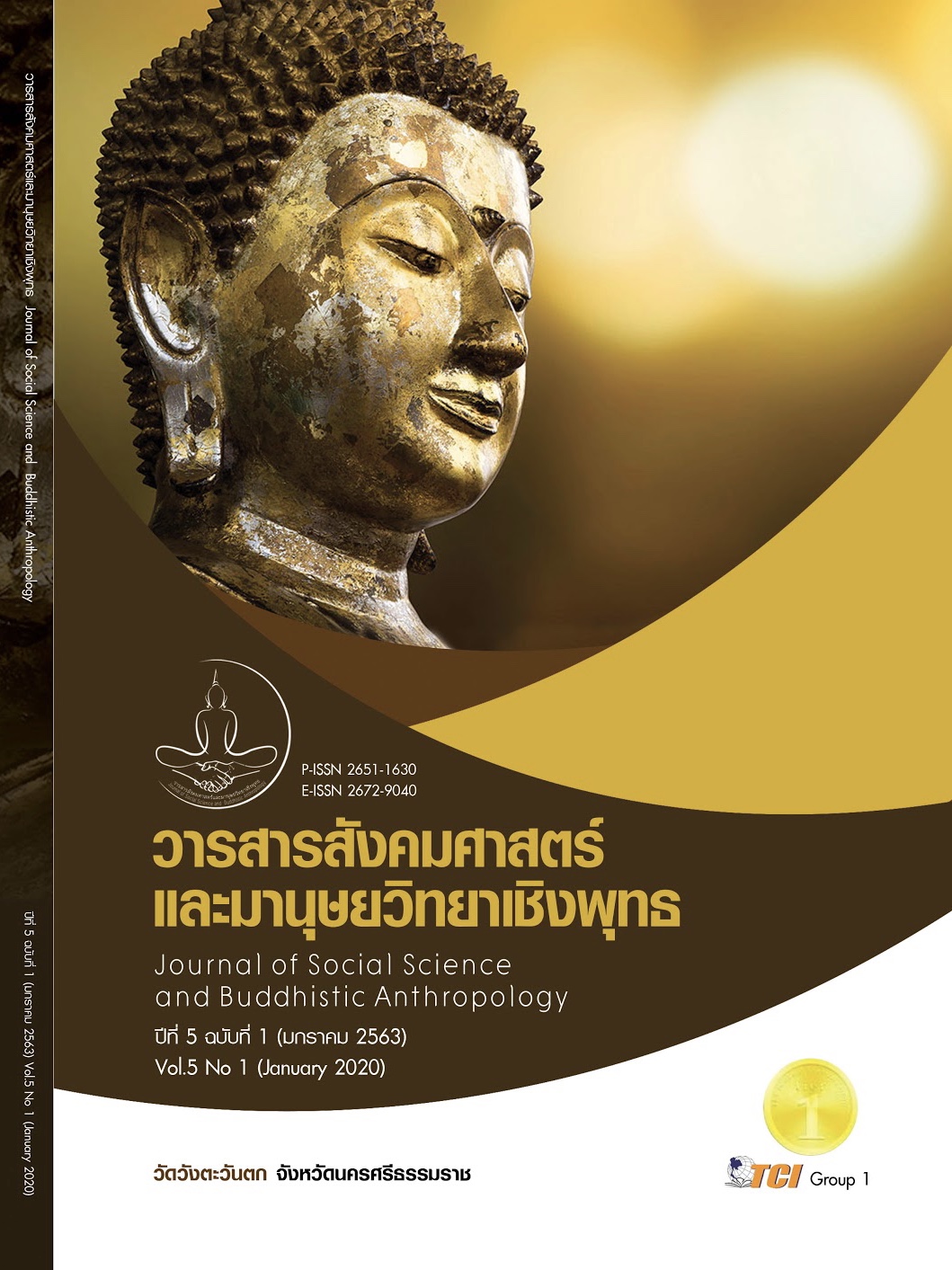THE DESIRABLE ROLE OF THAI MONK IN PRESENT AND FUTURE
Keywords:
The Desirable Role, Thai Buddhist Monk, Present And FutureAbstract
This article wants to point out the desired roles of current and future Thai monks. The author studied from the theory of roles based on western concepts. And the role of the Thai monks today, which is within the framework of Dhamma discipline Era and society comprising Ideal role Roles that people understand and the role that is actually expressed including the study of factors that cause changes in the role of Thai monks. Which the author uses the data from this document study to analyze together with the data obtained from in-depth interview area. Making it possible to see the trend of the role of Thai monks in the future Leading to the conclusion of the desirable role of the present and future the study result found that changing roles of Thai monks caused by three social factors ; the time period, social conditions and state conformity. The role of Thai monks in the future have tends to be in 3 characteristics as follows 1) The role of Thai monks in the future must adhere to the principles of discipline. 2) Be careful the risk of randomness to the world because the technological advancement can be people are able to access the information quickly and 3) Society also has expectations or wishes that monks should play a role in society in two states: spiritual leadership and leaders in community relief only that the monks need to change the format to be consistent with the time period and social conditions. As well as in accordance with government policies. By comparing the results of this study with previous studies, it was found difference, results provide answers on how monks play and how they will be change. Meanwhile the results of this study focus on the answer that how is the role of Thai monks in the present and future. Therefore, will meet the needs of society under the framework of the Dhamma discipline.
References
กองแผนงาน กรมการศาสนา กระทรวงศึกษาธิการ. (2540). คู่มือพระสังฆาธิการว่าด้วยพระราชบัญญัติ กฎ ระเบียบและคำสั่งของคณะสงฆ์. กรุงเทพมหานคร: โรงพิมพ์การศาสนา.
คณาจารย์ มหาวิทยาลัยมหาจุฬาลงกรณราชวิทยาลัย. (2550). ประวัติพระพุทธศาสนา. กรุงเทพมหานคร: มหาวิทยาลัยมหาจุฬาลงกรณราชวิทยาลัย.
จริยา จัตุพร. (2554). บทบาทหน้าที่ของพระสงฆ์ไทยในปัจจุบัน : กรณีศึกษาบทบาทและหน้าที่ของ พระมหาไพเราะ ฐิตสีโล, ดร. (กฤษณา). ใน วิทยานิพนธ์พุทธศาสตรมหาบัณฑิต สาขาวิชาพระพุทธศาสนา. มหาวิทยาลัยมหาจุฬาลงกรณราชวิทยาลัย.
จํานง อดิวัฒน์สิทธิ์. (2548). สังคมวิทยาตามแนวพุทธศาสตร์. กรุงเทพมหานคร: มหาวิทยาลัยเกษตรศาสตร์.
พระเทพโสภณ (ประยูร ธมฺมจิตฺโต). (2548). การเผยแผ่เชิงรุก. กรุงเทพมหานคร: มหาจุฬาลงกรณราชวิทยาลัย.
พระธรรมปิฎก (ป.อ.ปยุตฺโต). (2536). สถานการณ์พระพุทธศาสนาพลิกหายนะเป็นพัฒนา. กรุงเทพมหานคร: โรงพิมพ์กรมการศาสนา.
พระไพศาล วิสาโล. (2555). ทางธรรม พุทธศาสนากลางกระแสโลกาภิวัตน์. กรุงเทพมหานคร: โพสต์บุ๊กส์.
พระมหาสุภา อุทโท. (2541). บทบาทของพระสงฆ์ไทยใน 2 ทศวรรษหน้า (2541-2560). ใน วิทยานิพนธ์พัฒนาชุมชนมหาบัณฑิต สาขาพัฒนาชุมชน. มหาวิทยาลัยธรรมศาสตร์.
มหาจุฬาลงกรณราชวิทยาลัย. (2539). พระไตรปิฎกฉบับภาษาไทย ฉบับมหาจุฬาลงกรณราชวิทยาลัย. กรุงเทพมหานคร: โรงพิมพ์มหาจุฬาลงกรณราชวิทยาลัย.
สัญญา สัญญาวิวัฒน์. (2551). ทฤษฎีสังคมวิทยา : เนื้อหาและแนวการใช้ประโยชน์เบื้องต้น. กรุงเทพมหานคร: โรงพิมพ์จุฬาลงกรณ์มหาวิทยาลัย.
สำนักงานพระพุทธศาสนาแห่งชาติ. (2545). กฎมหาเถรสมาคม. กรุงเทพมหานคร: โรงพิมพ์สำนักงานพระพุทธศาสนาแห่งชาติ.
อนันต์ วิริยะพินิจ. (2529). บทบาทของพระสงฆ์กับการพัฒนาชุมชน. กรุงเทพมหานคร: สถาบันไทยศึกษา.
Cohen & Orbuch. (1990). Introduction to Sociology. Singapore: Mc Graw-Hill.
Coleman E. (1981). The developmental stages of the coming out process. Journal of Homosexuality, 7(1), 19-32.
Sarbin T.R. (1975). Role Theory Handbook of Psychology. New York: Addison Wesley Publishing Company.









